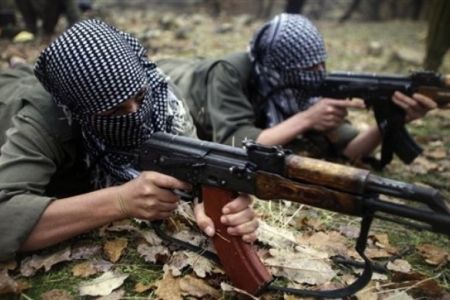| A senior commander of the Islamic Revolution Guards Corps said on Wednesday that the IRGC has made a firm decision to stage military attacks against PJAK due to US growing activities along Iran’s Northwestern borders. |
http://english.farsnews.com/newstext.php?nn=9007272731

"One of the main reasons for the IRGC's decisive and rapid reaction (to PJAK) was that Americans seemed to be plotting against our ruling system in the region," Colonel Hamid Ahmadi, who was the spokesman of the IRGC Ground Force during the IRGC operation in Northwestern Iran, told FNA.
Ahmadi said this supposition was supported by many corroborative evidence and proofs "including their (Americans) deployment along our borders and their insistence on maintaining presence in a number of border mountains".
"Thus, the IRGC decided to change the game with its speedy and decisive action and nip the plot in the bud, and its success displayed the power of the Islamic Republic's ruling system," he added.
PJAK's terrorist operations were brought to a halt after Iran's powerful troops pushed back the terrorists deep into Iraq's soil.
Earlier in October, Commander of the Islamic Revolution Guards Corps (IRGC) Major General Mohammad Ali Jaffari said Iranian forces are in full control over the country's borders in the Northwest after they repelled the threat of the PJAK terrorist group completely.
The latest round of clashes between the two sides started in July after the IRGC arrested several teams of PJAK, who intended to infiltrate Iran to stage terrorist operations in the country.
In response, Iran deployed about 5,000 military forces in the Northwestern parts of the country along its joint border with the Iraqi Kurdistan region.
During the operations, the IRGC forces killed, injured and arrested tens of terrorists and destroyed their headquarters in the bordering areas of Alvatan near Sardasht city in Northwestern Iran.
But, upon a request by Iraq's Kurdistan Regional Government (KRG), the group was given a one-month grace period during the Muslims' holy fasting month of Ramadan to retreat from the Northwestern borders of the Islamic Republic and stop its terrorist acts in these regions.
Later reports revealed that PJAK and PKK members had dug new tunnels in the Jasosan heights close to Iran's border regions during the truce, exploiting the IRGC ceasefire during the fasting month of Ramadan.
In addition, PJAK and PKK terrorists received new weapons and equipment, including 120-millimeter mortars and walkie-talkies, from the US consulate in the Northern Iraqi city of Arbil during the ceasefire.
After the end of the one-month deadline, the PJAK terrorist group paid no heed to the KRG's appeals and mediation and martyred two local Kurdish forces.
The IRGC resumed military operations against the Iraq-based PJAK terrorist group after its one-month deadline to the terrorist group ended.
PJAK reportedly called for a ceasefire with Iran after some of their members were killed and others were injured in the IRGC's latest round of operations against the terrorist group.
After the group sustained a heavy toll and injuries during the new round of IRGC operations, the ringleader of PJAK, Abdul Rahman Haji Ahmadi, told the BBC Persian channel that the group would continue fighting with Iranian forces if the IRGC refuses to accept the ceasefire.
In reply, the IRGC said it would not accept a ceasefire with the PJAK before the Iraq-based terrorist group leaves Iranian borders.
But, after repeated demands by the Iraqi Kurdistan Regional Government officials, the IRGC Ground Force called on the Iraqi Kurdistan's regional government to specify the terms and contents of the ceasefire demand presented by the Iraq-based PJAK terrorist group.
The IRGC Ground Force also underlined the necessity for the withdrawal of all outlaws, anti-revolutionary forces and elements of the PJAK terrorist group from the bordering areas of Iran.
PJAK, a militant Kurdish nationalist group with bases in the mountainous regions of Northern Iraq, has been carrying out numerous attacks in Western Iran, Southern Turkey and the Northeastern parts of Syria where Kurdish populations live.
The separatist group has been fighting to establish an autonomous state, or possibly a new world country, in the area after separating Kurdish regions from Iran, Iraq, Turkey and Syria.
Iranian intelligence and security officials have repeatedly complained that Washington provides military support and logistical aids for such anti-Iran terrorist groups.
